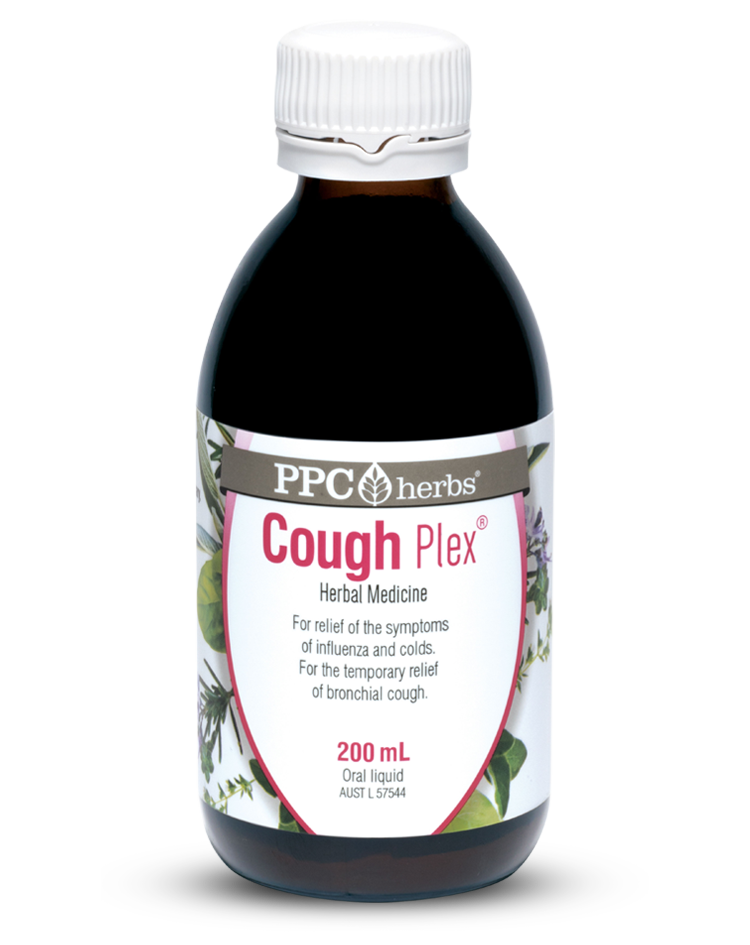Cough Plex ® is one of PPC Herbs’ range of listed herbal medicines. As liquid herbal solutions, each member of the Plex® family are suitable for the whole family to assist in the management of several different medical conditions.
PPC Herbs Herbal Medicines are Australian Made and developed by Herbalists and Naturopaths for health-conscious Australian consumers who want to manage their own health conditions naturally. Made from genuine botanical materials with no added sugars, no animal testing, vegan friendly and gluten free; Plex® medicines are ideal options for day to day health needs.

Cough Plex® Herbal Medicine supports the immune system to aid the body’s natural ability to resist infection.
Cough Plex® is traditionally used in Western Herbal Medicine to:
- Relieve the symptoms of influenza and colds
- Provide temporary relief of bronchial cough
Plex® Herbal Medicines are oral liquids. Scientific studies have demonstrated that liquids, as opposed to tablets or capsules, have faster absorption rates; higher optimisation rates and more easily digestible. Liquid remedies or medicines have a dosing flexibility where the daily dose can be diluted with water, juice or taken straight from the bottle.
Cough Plex® Contains the following botanical ingredients:
Horehound leaf, Marrubium vulgare
Marrubium vulgare (White Horehound or Common Horehound) is a flowering plant in the mint family (Lamiaceae). The leaves and flower tops of the horehound have long been used in natural remedies as a tonic for the common cold, and to relieve symptoms for lung and breathing problems including cough, whooping cough, asthma, tuberculosis, bronchitis, and swollen breathing passages. Horehound has been used traditionally as an expectorant and continues to find a place in cough lozenges and cold preparations.
The chemicals in white horehound can thin mucus secretions, reduce spasms in the stomach and intestines, and decrease swelling (inflammation).
White Horehound is also used for digestion problems including loss of appetite, indigestion, bloating, gas, diarrhea, constipation, and liver and gallbladder complaints. It is also used for
Liquorice root (dry), Glycyrrhiza glabra
Liquorice root, botanically classified as Glycyrrhiza glabra, is the underground stolon of an herbaceous, fern-like plant that belongs to the Fabaceae or legume family. Also known as Sweet Root, Gan Zoa in Chinese, Liquorice in British English, and Sweetwort, the name Liquorice comes from the French word ‘licoresse’ and the ancient Greek word ‘glukurrhiza’ both meaning “sweet root.” Liquorice root is predominately harvested when the plants have reached 3-4 years in age, and the roots are then dried. Liquorice root has been used as a medicinal ingredient for thousands of years in natural medicines.
There are more than 300 different compounds in liquorice, some of which have antiviral and antimicrobial properties. Among other ailments, it is traditionally used for upper respiratory infections such as coughs, asthma, and sore throats
Sage leaf, Salvia officinalis
Salvia officinalis is an aromatic member of the mint family (Lamiaceae). Its common names include Culinary Sage, Common Garden Sage, or Garden Sage. The word “sage” has come to mean “wise” or “a wise or learned person.” It’s scientific name, Salvia, means “to be in good health”, “to save”, or “salvation” while Officinalis is an old reference to an herb store, pharmacy, or drugstore.
Sage is often mentioned as the herb of immortality, domestic virtue, health, and wisdom. Sage was a sacred ceremonial herb of the Romans, and has been cultivated for both culinary and medicinal purposes for many centuries in Europe. Sage is also a natural source of flavonoids and polyphenolic compounds (e.g., carnosic acid, rosmarinic acid and caffeic acid) possessing strong antioxidant, radical‑scavenging, and antibacterial activities.
It is used in natural medicine for the treatment of digestive and circulation disturbances, bronchitis, cough, asthma, mouth and throat inflammations, and many other afflictions.
Thyme leaf, Thymus vulgaris
Thyme has long been used as a natural remedy to treat cough, cold and chest infections. It is also soothing for sore throat, as Thyme Leaf possesses antiseptic, antibiotic, and antifungal properties that smooth muscle spasms (coughing).
According to a 2013 study in the European Respiratory Journal, Thymol (a compound found in Thyme Leaf) acts on receptors on the tongue, mouth, throat, and nasal passages in a way that may suppress the number and severity of coughs and provide a cooling effect.
Key constituents of thyme include phenols (thymol, carvacrol), flavonoids, borneol, linalool, rosmarinic acid, saponins, tannins, terpenoids, and acetophenone glycosides.
Ginger root, Zingiber officinale
Ginger Root (Zingiber officinale) has been used as a natural medicine for centuries in Western Herbal and Traditional Chinese Medicine. Ginger and its general compounds such as Fe, Mg, Ca, vitamin C, flavonoids, phenolic compounds (gingerdiol, gingerol, gingerdione and shogaols), sesquiterpenes, and paradols has long been used to treat various symptoms associated with cough and cold like ailments. The pharmacological activities of ginger were mainly attributed to its active phytocompounds 6-gingerol, 6-shogaol, zingerone beside other phenolics and flavonoids. Gingerol and shogaol in particular, is known to have anti-oxidant and anti-inflammatory properties.
References
https://www.sciencedirect.com/
Complementary therapies require appropriate guidance from health care professionals. Persistent symptoms or a worsening of any condition should be discussed with your health care provider immediately.